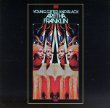She was well on her way to legendary status. She had already created her own space in music and the world. Aretha Franklin held a position that no other black female could by 1972. She was a singer, songwriter, pop and soul music icon six times Grammy-awarded. Her next recordings would be carefully studied by many.
So, in 1971, in a piece-meal fashion, using various musicians and studios, Aretha recorded her eighth Atlantic studio album and named it after its most significant of seven cover songs. "Young, Gifted and Black" was Nina Simone's song of freedom, an ode to her beloved friend Lorraine Hansberry, who passed before finishing a play of the same name. It was also for black people who felt the oppression of what Simone believed was "institutionalized racism."
She was well on her way to legendary status. She had already created her own space in music and the world. Aretha Franklin held a position that no other black female could by 1972. She was a singer, songwriter, pop and soul music icon six times Grammy-awarded. Her next recordings would be carefully studied by many.
So, in 1971, in a piece-meal fashion, using various musicians and studios, Aretha recorded her eighth Atlantic studio album and named it after its most significant of seven cover songs. "Young, Gifted and Black" was Nina Simone's song of freedom, an ode to her beloved friend Lorraine Hansberry, who passed before finishing a play of the same name. It was also for black people who felt the oppression of what Simone believed was "institutionalized racism."
Aretha, being the daughter of one of Detroit's most prominent civil rights activists, C.L. Franklin, was no stranger to revolution or its anthems. Mentored by Sam Cooke and Mahalia Jackson, Aretha was well aware of a musician's responsibility to inspire and motivate in trying times.
For a classic, the album is surprisingly cover heavy. Though it is popular in the early 70s to "interpret" other's classics, it's still a feat to pull off seven and make an album a "standard" when so many of its parts are borrowed. Here is where Aretha stands above the average artist. Opening with Lulu's "Oh Me, Oh My (I'm a Fool for You)," Re Re makes one tune after another her own, while inserting five stellar originals. Two Franklin originals are the singles to bring folks in. But even after "Day Dreaming" and "Rock Steady" have reeled in the fish, it's the execution and re-workings of the covers and tunes like "First Snow of Kokomo" that capture and captivate our full attention.
Even on a major album like Young Gifted and Black, Aretha's musicianship is as often overlooked, as her piano style is charismatic. The solo on "A Brand New Me" shows improvisational skill and personality. Alongside the Rhodes and organs of Billy Preston and Donny Hathaway, she easily blends whether on top or bottom of their chords.
Young Gifted and Black would bring Aretha her third gold plaque and seventh Grammy. It may only have been stunted by her own recording releasing Amazing Grace later in the same year. Grace went on to sell one-million copies (doubled in certification as it was a double album) usurping the promotion and sales of Young, Gifted & Black. Yeah, the only one bad enough to beat the Queen, was the Queen herself.
By Reg Jones

